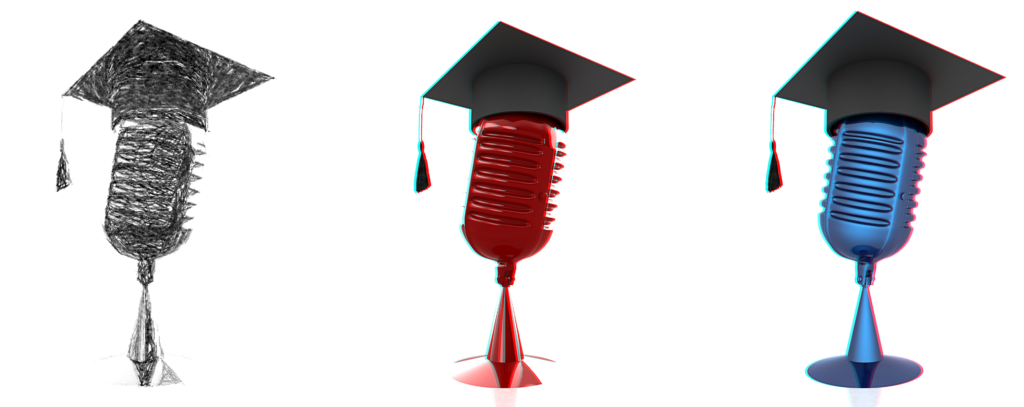
There is a lot of talk, especially post-pandemic, about the value of that piece of paper one receives for completing the requirements necessary for a Bachelor’s degree from an accredited college or university. As the minimum wage rises, and as employers simply cannot find workers, it is perhaps easier than ever to find a job, regardless of what your resume says.
Then there’s the gnarly issue of college loans – and the enormous debt so many are buried under. The Biden Administration has attempted to find a fair solution for this problem, but there really isn’t one. Even if those truckloads of debt are excused for some college graduates moving forward, what about the millions who scraped and saved to pay it off over the past many years?
In a blog post published yesterday – “No College Degree Required” – blogger, lifelong radio guy, and college educator, Dick Taylor, makes a compelling case that radio is more of a skill than it is a science or a discipline. He points to a number of massively successful radio stories – Ryan Seacrest and Sean Hannity among them – who have achieved unthinkable fame and wealth without the benefit of a degree.
That’s also the case in pro sports. It is about your innate ability, first and foremost. For NBA players who stuck it out to get that degree, there’s LeBron James who apparently did not need to sit through poli sci or algebra classes to achieve his greatness on the court.
But even in our changing world of technology and innovation, many of the best-known entrepreneurs and game-changers did not earn a degree. The list includes Bill Gates, Mark Zuckerberg, Steve Jobs, Richard Branson, and more – all geniuses who knew that college football games and fraternities weren’t in their futures. They were all better off honing their crafts and concepts in their families’ garages.
Dick’s bone to pick with radio is that the industry’s entry level pay scales are no longer competitive with those of many basic businesses, including the fast food industry. And he implores the RAB to focus its efforts with its newly acquired Radio Talent Institute at the high school level. Given the image of radio among high school students, it’s hard to argue with his logic.
He also argues that radio companies requiring college degrees is wrong-headed, and that radio would be “better positioned as a trade, one best learned by doing.”
For radio jobs in the 70s, 80s, and 90s (sounds like a positioning statement, right?), Dick’s description may be an accurate one. Many of the smartest people I’ve worked with – on and off the air – did not graduate from college. Many went right into radio from high school, snapping that first job and never looking back. And they went on to become brilliant programmers, marketers, and in some cases, executives.
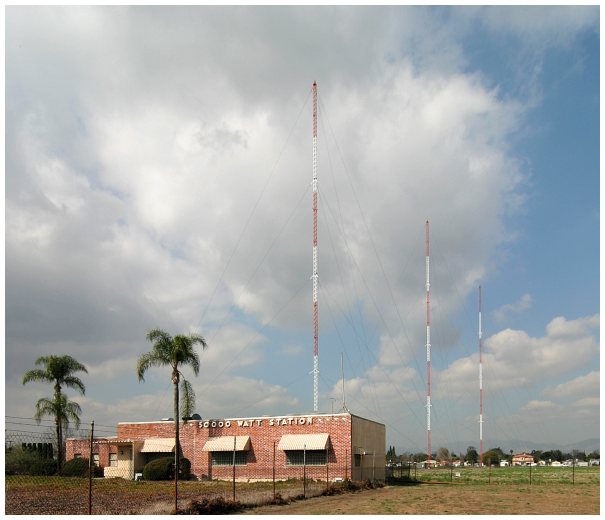 But we’re not in Kansas anymore. The radio industry as we knew it, no longer exists. We’re competing against young bootstrap entrepreneurs, savvy startups, and tech companies with access to the best and brightest – not just grads from state universities but from ivy league schools.
But we’re not in Kansas anymore. The radio industry as we knew it, no longer exists. We’re competing against young bootstrap entrepreneurs, savvy startups, and tech companies with access to the best and brightest – not just grads from state universities but from ivy league schools.
That’s no guarantee they’re any brighter than those doing morning shows, cutting promos, or selling radio time. But their educations complement their intelligence, allowing them to create the next levels of media and technology.
Think about the past twenty years. How many true media innovations – even in the radio business – can you think of that were game-changers or even industry-changers? Radio has been playing defense at best, catch-up at worst. And it has fallen behind.
We have long been at that point where great execution is no longer enough to generate larger audiences and greater profits. It’s about innovation, and the ability to invent new futures for old businesses.
And I would argue that while an education sure doesn’t hurt, it may not guarantee success. The human and talent factors loom large, of course. But when you take someone who already has great broadcast chops and you provide him or her with a great education, look out.
I met that person last week at the Canadian Music Week conference. His name is Tobias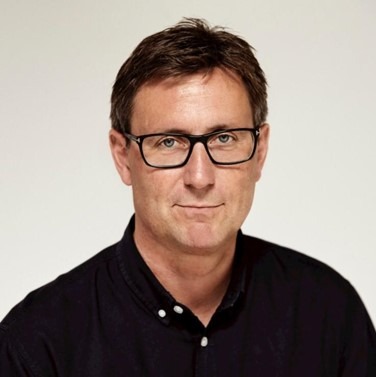 Nielsen (pictured) and he’s the Director of Premium Projects and International Lead Content and Music for the Bauer Media Groupo, Europe’s biggest commercial broadcaster.
Nielsen (pictured) and he’s the Director of Premium Projects and International Lead Content and Music for the Bauer Media Groupo, Europe’s biggest commercial broadcaster.
I was fortunate enough to introduce his keynote, and then participate with him on a panel that included broadcast executives from North America. I’ve also gotten a chance to know Tobias over the past few months.
Like many of you, he started on the air. As he told me, he was the “evening presenter” on a small hometown radio station in Denmark where he was born and raised. In other words, the night guy. And he worked his way up through the ranks, from programmer to manager to COO of a broadcast company.
His claim to fame? He has started up a premium subscription service for Bauer’s best commercial radio properties. And in order to convince his bosses of the efficacy of this bold plan, Tobias went back to school to gain the knowledge and discipline necessary to pressure-test his idea. He pursued and received an Executive MBA from the Copenhagen Business School.
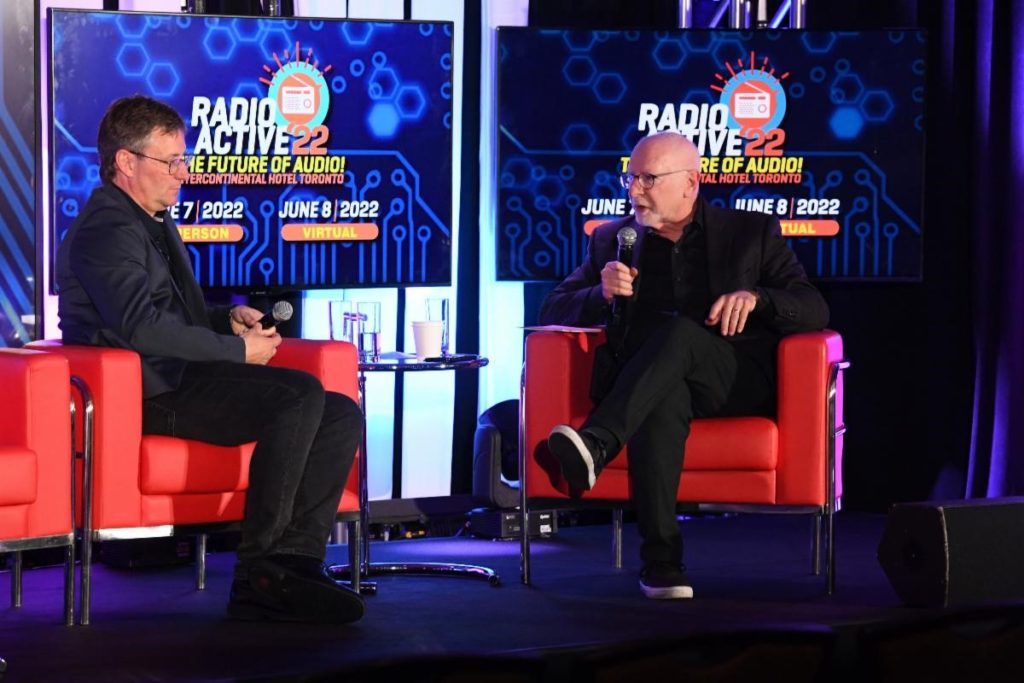 Over coffee, I asked him about the value of his education as he mapped out Bauer’s new path as a media and entertainment company. Without batting an eye, he told me how essential the structure of his MBA program was to honing his concept for a subscription radio service.
Over coffee, I asked him about the value of his education as he mapped out Bauer’s new path as a media and entertainment company. Without batting an eye, he told me how essential the structure of his MBA program was to honing his concept for a subscription radio service.
In a blog post he wrote on LinkedIn, Tobias explains:
“The MBA definitely played a big part in getting me here and – aside from the educational value – it showed me the value of being challenged and of trying something new. To come here and be faced with a blank sheet of paper would have been intimidating a few years ago, but now I can recognise the opportunities and I have the training to establish the team, perform the analysis and make the necessary decisions that will drive the project forward. It’s reassuring to know that you can rely on that business skillset.”
Is radio a “trade?”
Clearly, to run a board or edit audio (or video), it doesn’t necessarily require a four-year degree. I could argue that many colleges and universities have their own radio stations, ones that we strongly supported this past spring during Vinylthon 2022 in collaboration with the College Radio Foundation. You won’t find a better environment in which to “learn radio” and receive a higher education.
In recent years, we’ve seen some of the growing pains when air personalities are asked (much less required) to write blogs or social media posts. Some do it splendidly, of course. But others may be hampered by a lack of writing skills that make it more challenging to perform these tasks.
How about podcasting, an audio artform that requires writing, organization, and much editing? Or public radio, a corner of the industry where one college degree is table stakes. A majority of public radio core listeners in our PRTS surveys hold advanced degrees. If you want to inform and entertain them, you’d better have the goods.
When it comes to a college degree, “your mileage may vary,” of course. So much depends on who you are as a person, and your long-term goals in the industry. As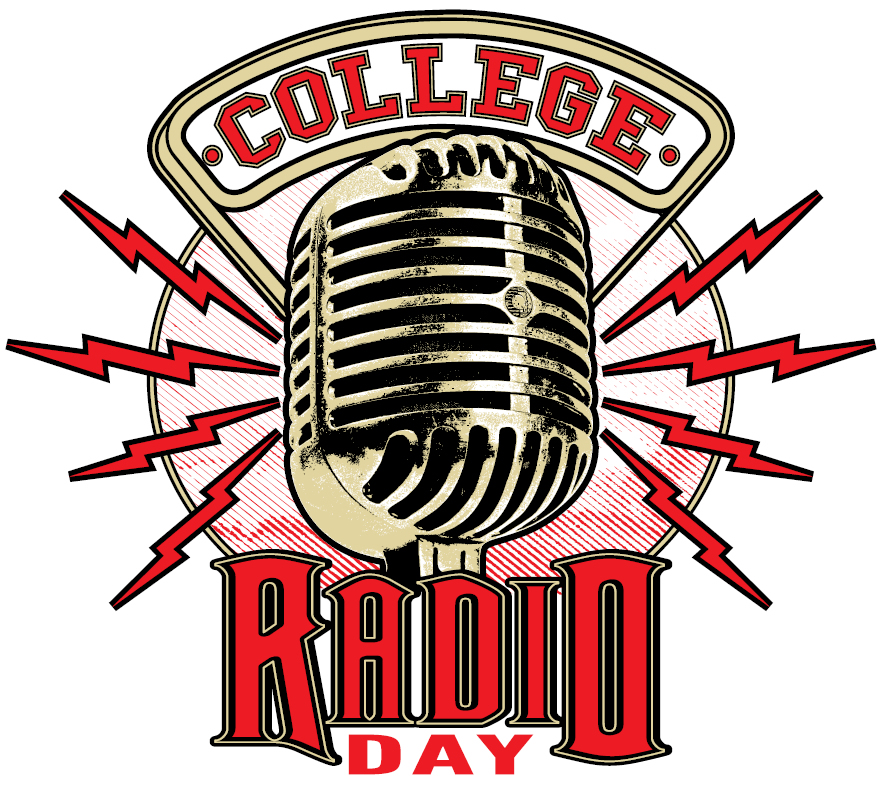 Tobias Nielsen discovered, his original education and experience only took him so far. He needed those MBA teachings and disciplines to get to that next level.
Tobias Nielsen discovered, his original education and experience only took him so far. He needed those MBA teachings and disciplines to get to that next level.
For the record, I have two degrees. A Bachelor’s in something called General Studies from the University of Michigan, and a Master’s in Telecommunication from Michigan State University. Rarely a day goes by when some piece of that education or experience doesn’t bubble up as part of my role as a consultant, a researcher, or an entrepreneur. But hey, that’s me.
If radio is to survive and thrive in the years ahead, it won’t be as a “trade” filled with journeymen and women. Succeeding in radio is not akin to driving a truck or installing a furnace. It is an art that can be best complemented by learned skills that can bring out the best of us. And to solve the complex problems we’re already facing as an industry, we’re going to need all the education we can get.
If you can afford it, get that degree.
Coming soon – AQ4 – our industry study of air personalities in collaboration with Morning Show Bootcamp. And yes, we’ll be asking a question or two about education. – FJ
- Why “Dance With Those Who Brung You” Should Be Radio’s Operating Philosophy In 2025 - April 29, 2025
- The Exponential Value of Nurturing Radio Superfans - April 28, 2025
- What To Do If Your Radio Station Goes Through A Midlife Crisis - April 25, 2025




I have a masters degree from major university and a bachelors degree from a fine private college. I still claim that the best education I got was from Brown Institute of broadcasting in Minneapolis. I also note that today going to college will get you much more of an indoctrination than education today. Barack Obama made a point of saying that everybody needed to have a college education. That is baloney. I love the story of the western writer Louis l’Amour who quit school at the age of 15 so he can travel all around and while doing it read hundreds perhaps thousands of books. Indeed we are in the twilight zone of this discussion but As Rod Serling would say, just an idea for your thoughtful consideration.
Stan, I totally get it. That Brown Institute education prepared you for running a board, announcing, and editing audio. But I would submit that your degree(s) delivered other skills and experiences, perhaps not as obvious. Four years in college is no guarantee you’ll have amazing life experiences. As you note, travel can be an amazing educator. Thanks for the comment.
Interesting column. Considering the low and uncompetitive wages in the radio industry, I wonder how one will pay back all that student loan debt?
Michael, it’s a dilemma, and none of us has easy answers. College or no, radio broadcasters are going to have to increase wages or continue to face unintended job attrition.
Well said Fred! There’s a good reason why most public media outlets require a degree.
No doubt about it, Sean. It’s table stakes to have a Bachelor’s if you plan on a public media career
When I’ve spoken to the Radio Talent Institute at Western Ky (where Dick Taylor was the University lead), I would often shock the class by saying, “your college degree is generally worthless for an entry level job in radio.”
After a few moments of silence, I would say, “But – it is invaluable for your career in radio.”
“The most important step for you is to get your foot in the door of a broadcast operation. Take a part time job and be willing to wait tables or do other service jobs…don’t expect your degree to get you a $50k entry position. And, you’d better set your parents expectations, too!”
“However, think of your degree as an investment in the trajectory of your career. That degree will be a major asset – after your gotten you’ve seat at the table.”
FOOTNOTE – todays MMJ jobs are much more demanding than our previous entry level board-op positions and I would now revise my comments to say a college education (if not a completed degree) is becoming MUCH more valuable than before
Thank you, Fred! Yes, a college education can come in handy.
As the Director of the Digital Radio Media Program at Volunteer State Community College, I can attest that our students can get a lot out of our program (especially if they’re on the Tennessee Promise or Reconnect program that lets them take their courses for FREE.) Running a board doesn’t take four years to learn, but that’s not all our students learn in our state community college.
They learn what to talk ABOUT, because they have to take some gen ed classes. They have to learn public speaking, and a science, and math (the smart ones take statistics – gee, think that comes in handy for future programmers?) We teach them social media skills, how to blog, how to podcast, how to shoot and edit video and compose a story. How to do multi-level production. How to interview a subject in an entertaining way. Does the average PD have time to teach them that in this multi-tasking era in radio?
We give them an opportunity to create a demo for a prospective employer that showcases what they’ve learned, and we help them perfect those skills.
We require them to do internships to get their degrees. That gets them into a broadcasting business to “hone their chops” before it costs an employer money.
It’s very frustrating for me to read about “lack of talent” and hear the same gripers say those who try to break into the biz don’t need college.
Someone needs to train these kids, and management doesn’t have the time. So they fill gaps with imaging that’s usually very basic and uncreative, because no new talent has learned how to do it properly.
By the way, Ryan Seacrest spent a year studying journalism at the University of Georgia – think he uses anything he learned when he’s interviewing folks on his talk show with Kelly? And he got a shift at Star in Atlanta after studying broadcasting in high school. So yes, studying was involved! Ryan was fortunate to get coached by Star’s PD back then – today, most PDs are running multiple stations and/or doing multiple shifts for their companies.
Dianna, these are great comments, and the paces you put these students through is impressive. Your money line: “Someone needs to train these kids, and management doesn’t have the time” is spot-on. But it’s not just for lack of time. Few invest the resources into onboarding new employees, much less providing outside training. It’s no wonder many personalities feel the industry has passed them by. Thank you.
While I don’t have an MBA (or any Master’s degree), there are plenty of other cases where having one has helped a person expand their career–or transition into a new one…
https://fortune.com/education/business/articles/2021/04/27/the-worlds-4-most-surprising-mbas
Also, Mr. Nielsen is probably busier now–given that Bauer has just closed on its purchase of a national station group in Portugal.
Tobias talked about Portugal at CMW. More on him and Bauer’s premium model in tomorrow’s blog post. (Teasing ahead.)
This is a great topic!
There are so many variables, that it’s impossible to answer the question with a “yes” or “no” on whether a university education is necessary to work in the industry.
So much depends upon the person and the role within the industry. Historically, there were broadcasting companies which would not promote managers to more senior level positions without a bachelor’s degree – and to move further up the line required an MBA (or to at least be in enrolled in the program, with the understanding one had a deadline to earn those degrees for advancement opportunity).
The question may also be misconstrued. You likely do need to be a CPA and degreed in finance to work in finance and some corporate leadership roles in a significant radio company.
However, what about content and sales?
One simply can’t judge another’s natural talents or intelligence by whether that person has a university degree or not.
Anyone who can type, operate an iPhone or tablet can handle the technical side of things for the most part to handle a broadcast. Company training in sales is an important tool.
The hardest part is expecting the same result when sending 10 people to university for Broadcasting/Media. So much is about the person.
Success on the content and sales side relies so much more upon the candidate’s personality, makeup, drive, ambition, chemistry, life experiences, ability to engage and activate people, etc.
Those are attributes which additional education can enhance, but if one does’t have those natural abilities, anything including a PhD in broadcast media, is worthless.
I never took a broadcasting course in my life, however I do have a degree from a “good,” whatever that means, private institution. However, because it was not a “media” university, I was educated in journalism, economics, political science and history. I learned “radio” from working in commercial radio during high school and college – and served as the GM of the college station. There was no “radio” coursework, whatsoever.
That was a different time, however, and I was mentored by some of the best in the business (and by a few in my more recent years, as well, that I’ve learned to better appreciate).
On the TV side, colleges seem to crank out “Barbie and Ken dolls” who know how to operate phone apps, set up a tripod and do a live shot from a fire before burning out and taking a “real job” in PR. Some are from some very “prestigious” schools, yet are unable to start a sentence without the word, “So” – or by saying “Hey guys.” Wrong pronunciations, overuse of the first-person pronoun, referring to a viewer as “everyone,” bad writing, poor grammar and “The Wonder of ME,” abound.
On the radio side, there seems to be a mix of the self-taught and others (college or no) who really seem to love to create great content – for fun. They literally
play hard at it and get noticed more than the university student with a 4.00 GPA. Radio and other audio platforms seem to be the best places to learn to communicate.
The best radio (and other media) people are students of people, places and things. The best are engaged, interested and don’t view building their brand through the lens of a time-clock. They love to see the world at eye-level and in person, versus only in a darkened room on a 3.5-inch screen. They live to learn – and to communicate what they observe.
It may be from a humorous, serious or specialized POV – or all of the above…
Does one need a university degree for that?
Perhaps…
Perhaps not…
DISCLAIMER: Ask someone from a state university-run NPR affiliate. Their answer will publicly be one of “inclusion” for degreed and non-degreed alike as candidates.
However, when being judged to be considered for employment, a board of 20 or so individuals from academia will be most impressed with your academic credentials. These expensive and impressive status symbols will better qualify you to read a weather forecast and an underwriting announcement, using a contrived, pretentious delivery. Stardom and high compensation will be earned by doing so during your one-minute local cut-away on “All Things Considered.”
Tom, you lay this out well. (I would argue that there’s your degree at work, but I suspect you were a critical thinker well before you attended college.) It is not a one-size-fits-all situation, and never will be. I for one was not ready to enter college at 17, but did so anyway because in my house, there was no choice. As the oldest kid, I didn’t have anyone above me to shine the light. I learned the hard way, including being expelled by Michigan after my sophomore year. I was readmitted by the skin of my teeth, and from that moment on, came to value my opportunity to obtain a higher education. Thanks for tying my loose ends together, Tom.
I majored in English literature and graduated from a small liberal arts college in 1977. WBZ’s Larry Glick told me to get the broadest education I could. Started working in radio while in college. Worked at it for 15 years. I happen to think that my education was particularly helpful to news writing and the many interviews I did over the years. Yes, college isn’t for everyone. It worked out ok for me. Admittedly, I went on other things. My view is college helps folks navigate different perspectives on a wide range of matters.
I’m with Larry Glick. Critical thinking isn’t a major, but if you’re paying attention, you learn how to think, process, evaluate, and strategize. I may be old school, Dick, but I still am of the mind a liberal arts education has value. BUT it is no guarantee your first job will pay six figures and you’ll be able to WFH.
Funny thing about a degree. It comes in handy – a lot – at the oddest moments and intersections. But as you point out, it’s not for everyone. And not for everyone’s who turns 18. Sometimes, waiting a year or two makes sense. In retrospect, that would’ve helped me. Appreciate the comment.
Thank You Fred for picking up on my blog and expanding the discussion. The reason I write my blog is to stimulate discussion about what radio needs to be doing to not just survive, but thrive in the 21st Century. Let’s hope all the discussion that occurred on both of our blogs and on social media leads our industry’s leaders to make some meaningful changes.
Just about everyone my age (69) who got into the radio business, did so while still in high school. For me, the entrance door was via Junior Achievement. JA was just beginning to experiment with the idea of having service companies. The Junior Achievement program was created to help high school students understand the principles of running a business by selling stock ($1), forming a company, deciding on what product to make, making that product, selling that product and then liquidating the company and returning (hopefully) a monetary value greater than the $1 invested by the stockholders; all during a single school year.
One of the local radio stations in my town, came to my 10th grade high school assembly and made a presentation about forming a JA Radio Company. I set my sights on being in it, and made the cut. One of my best friends also made the cut and has retired from a very successful radio and voice-over career of 50 years.
I was the GM of my college’s carrier current AM radio station and worked to secure an educational FM license before graduating. WJJW remains on the air to this day at the Massachusetts College of Liberal Arts.
I was a commuter student with no student loans, but back in 1970, such a thing was more the norm than the exception. According to the National Center for Education Statistics, during the 1970-71 academic year, the average in-state tuition and fees for one year at a public non-profit university was $394. By the 2020-21 academic year, that amount jumped to $10,560, an increase of 2,580%.
In other industries, it’s not uncommon for companies to actually pay for their best employees to earn their college degrees in order to further their advancement. I have a son-in-law that learned his computer skills in the military and works for a military contractor in DC. He’s been working with the highest level of military leaders at the Pentagon as well as with members of Congress. After 17 years of constant achievement, his company is paying for him to complete his college degree. He currently maintains a 4.0 GPA.
His degree, ironically, won’t even be in the area that he works in, but in an area that gives him passion outside of his job.
The point of my article wasn’t to dis getting a college education, but for our radio industry to begin recruitment and training at the high school level. Radio needs to be a way for talented individuals to be exposed to what a wonderful business radio is, and have a way to enter without being screened out by a computer algorithm looking for a college degree. (You can’t see talent on a spreadsheet.)
Clear Channel used to run a wonderful training program called Clear Channel University. It succumbed to one of the many rounds of budget cuts.
The RAB’s Radio Talent Institute is an excellent program and my point was it should be run in the high schools across America.
Companies interested in retaining and growing their best employees should be making higher education opportunities a company benefit.
When the NAB offered a Sales Management Program through the Wharton School, I paid my own way and went. I already had an undergraduate degree from a four year college and a master’s degree from a university, but I never had the specific training that this program offered for the job I had been promoted into.
The owner of the radio stations I worked for at the time, provided a lot of training for its people. We attended the annual Managing Sales Conference hosted by the RAB. I earned my CRMC, Diamond CRMC and CDMC from the Radio Advertising Bureau.
I always told my college students that their degree wasn’t the end of their learning, but the launchpad to a life of learning. Every year of your life, learn something new, experience something new, grow your knowledge in life.
Think about what you can add to your resume that will make you a more valuable person to your company, your family and yourself.
I agree with what Tom Langmyer wrote, that at the core, it all comes down to the person. Having a PhD doesn’t equal a great air personality or salesperson.
My success in hiring was to first hire for attitude and then train the person for the job that needs to be done.
When the raw talent at affordable prices is sitting in high school classrooms today, why is the radio industry waiting till college to begin recruiting?
Dick, first and foremost, thanks for giving me something to talk about on a Monday. (Langmeyer also makes a compelling case.) So much of what is “right” comes down to the person. Some make the most of their tine on campus, while others waste it partying or simply by not being focused. Others are motivated and energized to get into radio without needing that piece of paper. They are experiential and learn by observing and doing. As Tobias Nielsen learned, however, when “DJs” (or presenters) strive to become executives – and we’re talking names like Pittman, Mohn, Dan Mason, Gary Stevens, and others too numerous to mention, that piece of paper can become a road map to the future.
Thanks for engaging – again – on this important topic. I appreciate your POV and your passion, as do your many readers.
I would love to have finished my degree in Business Administration.
I didn’t, basically, for two reasons:
1. My dad wanted to impose it on me, so in my adolescent rebellion I didn’t put much effort into it.
2. When my third semester was moving forward, I was given the opportunity to do radio, something I started doing as a hobby and little by little it became my profession. Also, they paid me very well!
Unfortunately, and despite the passion I put into radio, I never imagined that I would get to occupy senior management positions, as I did. My career in radio was so dizzying, changing and entertaining that I couldn’t find the time to resume my studies.
I am sure that I would not have wasted so much time, I would not have made so many mistakes and I could have advanced more quickly in my achievements.
Thanks for your article Fred. Very enriching, as always.
And thank you for your story, Tito. I think a lot of people could relate to it.
BTW, many colleges no longer offer degrees in broadcasting but have Communications degrees which focus on mostly digital marketing and video and less on radio.
I am becoming more and more aware of this. My own alma mater, MSU, used to call it the TV/Radio Department. It was changed (while I was there) to Telecommunication. Along the way, they’ve forays into telephony, digital media, video gaming, and other areas of study. The student radio station, Impact 88, continues to provide hands-on radio experience. But you are correct, Bradley, that many schools have gravitated away from broadcasting.